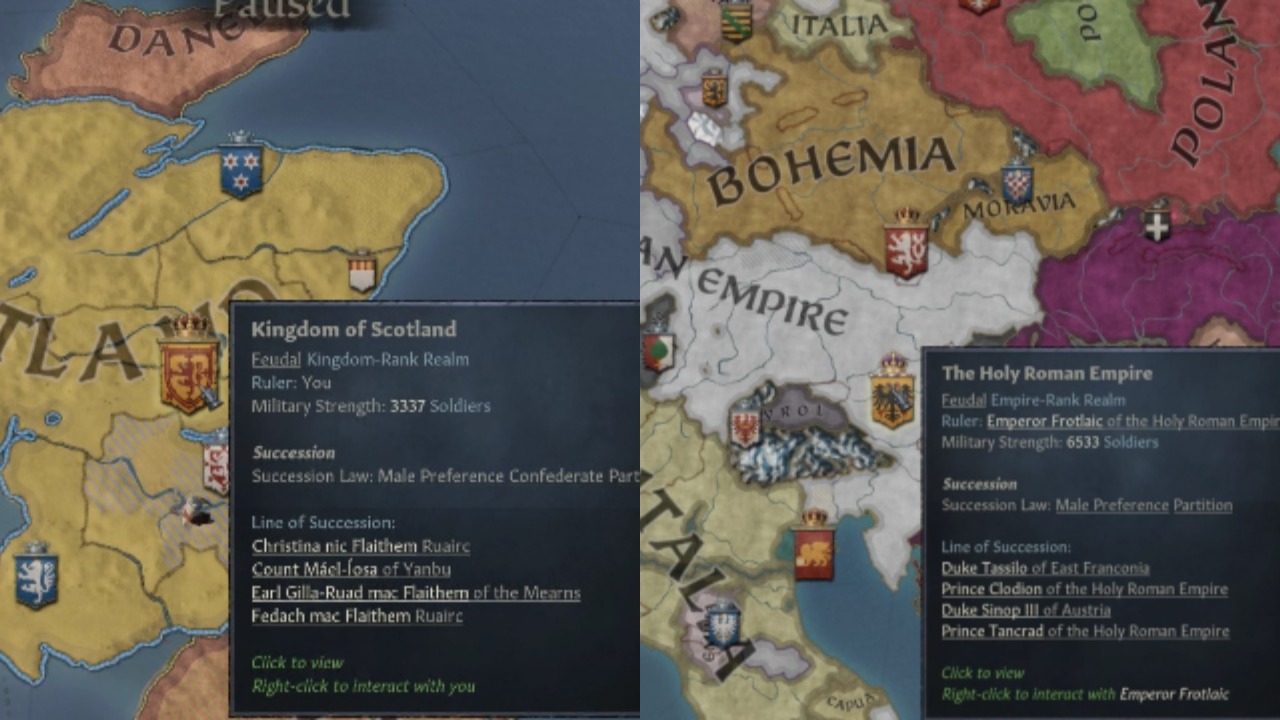While playing Crusader Kings 3, you’ll be paying a lot of attention to titles. Titles determine your position in the world, what land you own, what power you have, and how it interacts with the titles associated with it. However, unless you’re a medieval expert, figuring out the differences between baronies, counties, duchies, kingdoms and empires. Below, we’ll cover how titles work in Crusader Kings 3 and how to use the relationships between them to your advantage.
How do titles work in Crusader Kings 3?
There are five ranks of titles in Crusader Kings 3:
- Baronies – Baron/Baroness: A single barony/bishopric/city/etc
- Counties – Count/Countess: Two or more baronies/bishoprics/cities/etc
- Duchies – Duke/Duchess: Two or more counties
- Kingdoms – King/Queen: Two or more duchies
- Empires – Emperor/Empress: Two or more kingdoms
However, depending on the culture you’re playing as, a title may be called something different. For example, the Irish use the term Earldom for a Barony and Petty Kingdom for a Duchy, but they’re functionally the same. If you hover the cursor over the coat of arms for an area, you’ll see its rank underneath its name.
The lowest rank a playable character can have in Crusader Kings 3 is Count (or its equivalent). You must have at least one county under your control to continue playing, and your heir must be a part of your dynasty. So, even if your character eventually gains a Kingdom or Empire level title, you’ll want to keep some land under your direct control in case that title is lost for some reason.
Just because you have a title doesn’t mean it’s yours forever. Other characters in the game may have a de jure claim to your land, which gives them the right to take military action to seize it. This also prevents you from just declaring war and taking whatever titles and land you desire (though wars of conquest and holy wars can be declared under the right circumstances).
However, the interesting part is you can get de jure claims based on titles you hold. In the tutorial campaign, you play as Ireland in 1066 and are tasked with establishing the High Kingdom of Ireland. If you meet the qualifications to become high king and establish the title, you’ll get a de jure claim to the entirety of Ireland.
When should I grant titles in Crusader Kings 3?

You can’t just horde titles in CK3. Your domain, that is the lands under your control, have a limit, and you don’t want to hold too many Duchies or your vassals will become jealous. Luckily, granting titles is a great way to make friends as it gives that person a major opinion increase.
You do have to be careful when selecting who to grant a title to, which can be done in the context menu when right-clicking on a character. Most of the time, it’s best to keep your titles within your dynasty. The reason for this is two-fold. If you’re the head of your dynasty you can leverage more control over members of your house than you can other vassals. Additionally, if you grant a title to a family member and they leave your kingdom or empire, it’s a lot easier to get a claim on it and take it back.
The main things you need to watch out for when granting titles are:
- That the person receiving the title remains your vassal instead of going independent. For example, this can happen if your primary title is duchy-rank and you grant a duchy to a vassal.
- That the person’s who is receiving the title’s heir is either one of your vassals or that you have installed laws that prevent titles from leaving your realm. Otherwise, you may lose land when a vassal dies.






